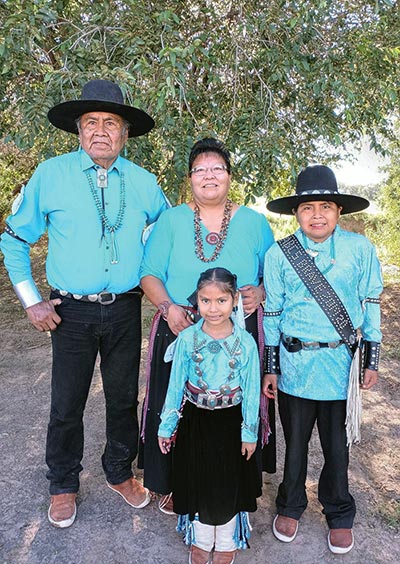
Imitating Atsá
TSÉBIGHÁHOODZÁNÍ
They imitate the eagle––the birds.

Courtesy photo | Vanna Etcitty
The Naat’aanii Nééz Singers from left to right, Roy Etcitty, his wife, Vanna Etcitty, and their son, Trey Etcitty, 12, and a youngster, pose for a photo wearing their traditional outfits.
Roy Etcitty, who leads the Naat’aanii Nééz Singers of Shiprock, says “anyone” can mimic the birds, but they would have to practice.
Etcitty’s singing group is Northern Navajo style mimicking the eagle, a piercing falsetto, that he teaches to his children.
“That’s how we’re supposed to sing,” Etcitty said. “When the medicine man starts singing, he tries to reach that high level of singing––the eagle is the only one that goes into the heavens and comes back to earth.
“We’re supposed to sing (songs) in the high eagle tunes,” he said. “I teach my kids, that’s how it is. High soprano, tenor, base––we try to sing the eagle tunes.”
He explained, “People don’t know that it’s in their DNA, that they can sing like that, but it’s hard to convey to other people that they can actually do it.”
The Naat’aanii Nééz Singers, comprising Etcitty’s wife, Vanna, and their sons, can do it. They say it’s all about Diné Bizaad and culture.
For the group’s youngest member, Trey Etcitty, Roy’s son, singing with his family is helping him to strengthen his Navajo-speaking and feel close to the culture.
Trey, 12, is Tł’ááshchí’i and born for Hashtł’ishnii. His maternal grandfather is Bit’ahnii, and his paternal grandfather is Tó’aheedlíinii.
“He (Roy) taught me a lot,” Trey said in an interview with the Navajo Times. “He also taught my brother and sister.
“My dad told me, ‘It’s the eagle-style of singing––high notes,” he said. “Basically, it’s singing high in the heavens like the eagles.”
Trey says he’s embracing his language, which makes him feel good and proud. He says he knows his ancestors listen to him.
And it relates to a traditional way of life, said Trey, who took part in the Presidential Inauguration at the Bee Hółdzil Fighting Scouts Center alongside his father and mother.
Diné Bizaad
“I tell them to be totally different from everyone else,” Roy Etcitty said. “I was taught in college that the more languages you speak, the smarter you are.
“Navajo is our home––language. Back in the old days, you were prosecuted for that,” he said. “(We) older people, we suffered, and the English language was beaten into us when we went to boarding school. I suffered that and I tell my kids, you can two or three different languages like the old days.”
Etcitty is Hashtł’ishnii and born for Tó’aheedlíinii. His maternal grandfather is Táchii’nii, and his paternal grandfather is ‘Áshįįhí.
Etcitty says he remembers his grandfather, Jim Dick, a hataałii, and his father, Tó’aheedlíinii Nééz, several different languages, including Ute, Pueblo, Spanish, and Apache. But they never spoke English.
Both his grandfather and father knew Hózhóǫ́jí and Naayéé, and told stories.
“That’s how I know we can talk two or four different languages,” Etcitty said, “like they did back in the old days. There’s nothing wrong with talking Navajo and English.”
Etcitty believes the entire world’s population will speak English by the end of 2043.
He’s teaching his children that the Diné have their own god – Haashch’ééłti’í, Haashch’ééwaan, and Yódí Ałtaas’éí – and they need to be conversed with in Diné Bizaad.
“Navajo is a very special language,” Etcitty said. “Some of the things that we say cannot be conveyed into English.
“I think we’re phasing out. It’s really hard to talk to your kids and tell them that speaking Navajo is beautiful,” he said. “I heard the young (child) talking at the inauguration and she was about 6 or 7 years old. It brought tears to my eyes––at least there’s a young one out there talking Navajo. How long are we going to last before we fade into the white society?”
Etcitty said he would like to speak only Navajo, including singing and praying in the language.
“I wish we could all talk Navajo,” he said. “It gets complicated in life––one day we’ll be like the white man. I was taught in (my) younger days, ‘If you believe in God, you’re close to being a white man.’ But that’s not true anymore. I believe in being who I am. I am proud of who I am.”








 Highway 264,
Highway 264, I-40, WB @ Winslow
I-40, WB @ Winslow